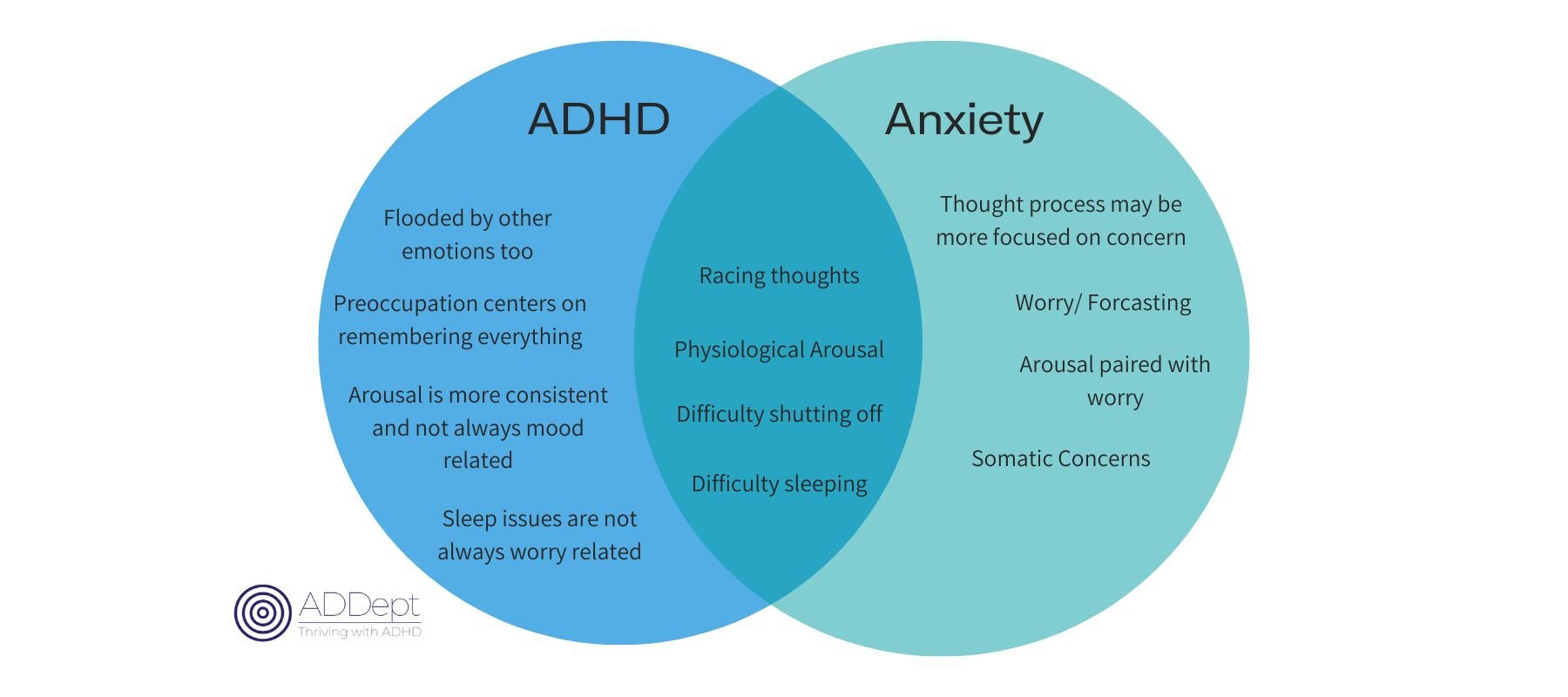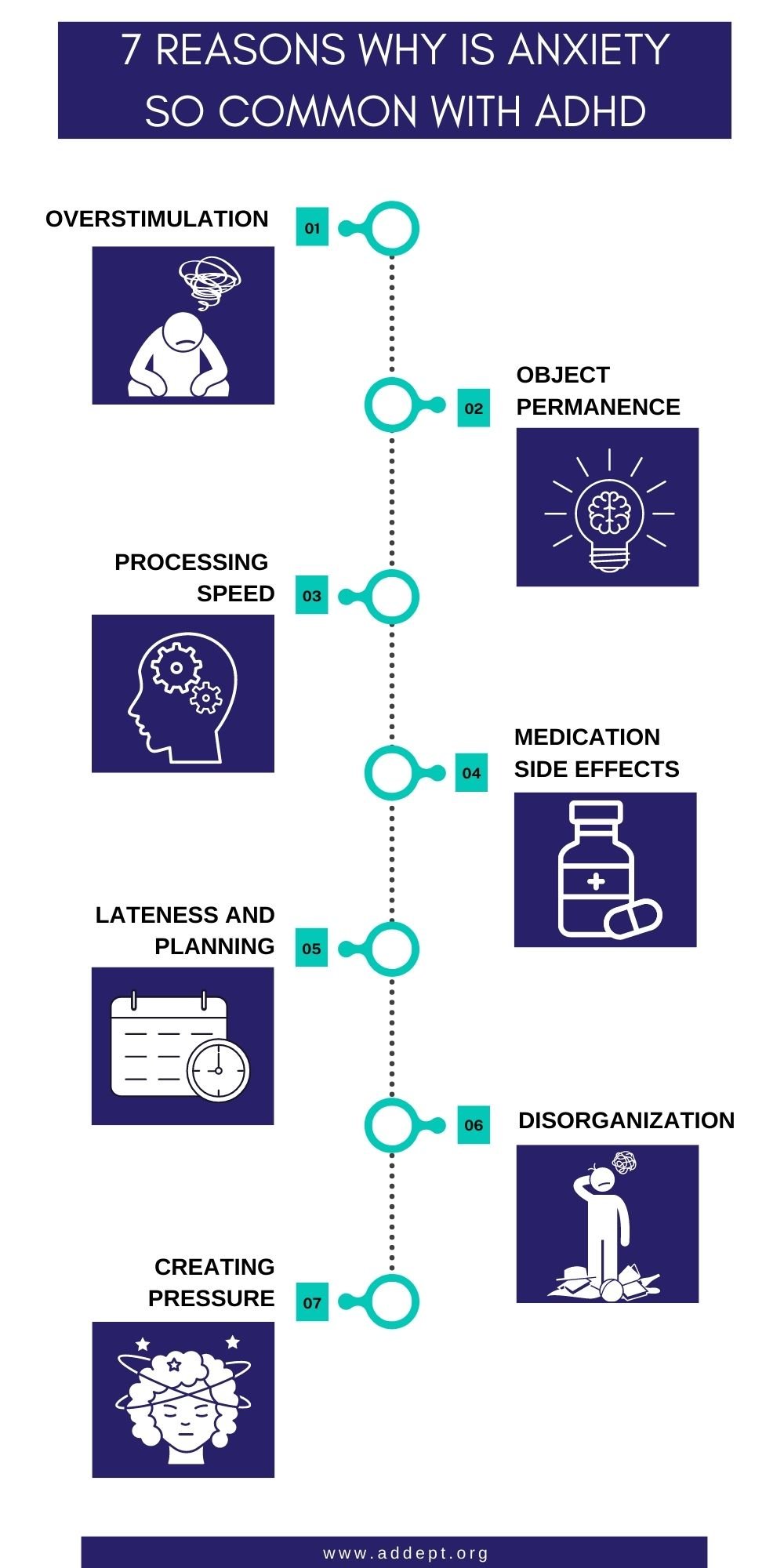Why am I so anxious all the time?
ADHD and Anxiety Adults
ADHD and Anxiety in Adults: The Ultimate Frenemies
Anxiety is like your ADHD’s ultimate frenemy. It’s always hanging around, claiming to be useful- claiming your ADHD can’t possibly live without it. But the minute your ADHD turns around? It’s sticking out its foot so ADHD flat on its face, just to swoop in and say- see?!? I told you, you need me!
Pretty obnoxious- right? Yeah.
And yet- both anxiety and ADHD serve each other.
Which means if you want to lessen the anxious knots your brain runs through, the key becomes not just what’s creating the anxiety but also how does the anxiety help. Because, like the kid on the playground whose frenemy didn’t come out to play- your ADHD will go in search of something else to take its spot if anxiety’s not there.
ADHD vs. Anxiety: How to tell them apart?
So, first, let's talk about ADHD and anxiety and how to tell them apart. Because they’ve got a lot of overlap- they both cause overwhelming feelings, they can both make you feel keyed up and tense, and they both cause racing thoughts and insomnia. So let's tease them apart:
ADHD and Anxiety Similarities:
Both ADHD and anxiety share some of the same symptoms, like:
Restlessness/ Physiological Arousal
Racing thoughts
Insomnia
Overwhelming Feelings
ADHD and Anxiety Differences:
But even those similar experiences differ in quality for ADHD (without anxiety) brains:
Restlessness tends to be more long-standing, not just when worried
Racing thoughts are not always only worried/ future-oriented
Insomnia isn’t always tied to worry/ fear
ADHD brains get overwhelmed by lots of feelings- not just anxiety and panic.
Why is anxiety so common in ADHD brains?
Not only is there a lot of overlap in Anxiety and ADHD- both in terms of the symptoms and the brain functions that create those symptoms– but the two show up together with incredible frequency. In fact between 50-55% of adults with ADHD also have an anxiety disorder. And in my experience, a huge majority of the remaining 45-50% may not meet the full criteria for an anxiety disorder but still, show significant anxiety symptoms.
Why is that? What makes ADHD look for its anxiety frenemy to come along?
7 Reasons why is Anxiety so Common with ADHD
At its base, anxiety is “trying to help” an ADHD brain. But all that trying- comes with some pretty hefty consequences. Let’s explore the 7 things it’s trying to do:
1. Trying to see through the noise: Overstimulation
ADHD brains are brains that don’t filter extraneous details- which leads to some of the incredible novel problem solving they’re known for - but it also can lead to tremendous overstimulation. This overstimulation bombards our nervous system and gives it the sense that it’s under attack. And what happens when our nervous system is under attack? It gets our body ready to fight off that attack- tensing muscles, quickening our breath, and revving our heart rate.
And the funny thing is- that then (after the body has already revved up for the attack) our brains swoop in and try to figure out why we’re so keyed up. And assuming that overstimulation isn’t actually a war zone and you’re not really under attack, your brain is going to start looking around trying to make sense of that response, therefore coming up with reasons you should be fearful, worried, or anxious.
2. Trying to Keep it in Mind: Object Permanence
ADHD brains lose track of things that it doesn’t see. This is why the meds need to stay on the counter and the friendships fizzle after you move across the country. But we can’t keep everything we need to remember in plain sight so the ADHD brain is often trying to keep as many things front and center in its mind as possible.
Anxiety comes in here to help out to try to make all these things you want to keep track of important and to raise the stakes so they don’t fall away.
3. Trying to Keep Up: Processing Speed
Many ADHD brains, while super smart and able to think through complex ideas and reason with the very best of them- don’t do all that great thinking as fast as others. Or, more accurately- ADHD brains often aren’t as fast as they are capable. And so anxiety steps in here too- trying to speed things along. It’s like your mom in the 5 minutes before school- constantly trying to get you to hurry up get your shoes on, finish your breakfast, and brush your teeth. Anxiety plays the same role here- trying to move that brilliant brain of yours along so that it doesn’t lose that brilliant thought.
4. Trying to Treat: Medication Side Effects
Not only does anxiety come along to keep your ADHD brain on track, but then often the stimulants that can be so helpful, can end up adding to that anxiety. Stimulants increase activation in your body- which is great because it fills your brain with the dopamine that it craves. But it also means that it can rev up your system which your brain can then interpret the fear and anxiety- once again looking for reasons that should be so.
5. Trying to keep track: Lateness and Planning
When your ADHD brain is struggling to show up on time, to think through what needs to be done, and how to do it— all at exactly the right time— anxiety comes on the scene to try to keep it all straight. Anxiety tries to increase the pressure and make it more important so that your brain will pay attention and show up on time with everything it needs.
6. Trying to keep tidy: Disorganization
The fact that an ADHD brain struggles with object permanence and therefore keeps lots of things out. Combined with its tendency to move on from a task when it’s only about 60-80% done, means that there’s often a lot of stuff. All that stuff - starts to overstimulate the ADHD brain and it can make it so that it’s hard to recognize what’s important- triggering anxiety onto the scene to trigger you to see what’s important and protect you from the onslaught.
7. Trying to get going: Creating Pressure
One of the biggest roles of anxiety in an ADHD brain is its ability to create pressure. And because pressure is one of an ADHD brain’s 4 motivating factors- this can be extremely useful– painful for sure- but also, useful. So when something is coming due or an important event is about to begin, anxiety creeps in to get your ADHD brain moving.
The Impact of anxiety on an ADHD brain
So we know that anxiety is, at least in part, trying to be helpful- trying to motivate, keep track, and speed up the ADHD brain. And the truth is- it’s pretty good at those things. But what about anxiety’s dark side? How does it end up stabbing ADHD in back at every turn?
Sleep:
Anxiety can make sleep even harder than it already is for ADHD brains. And when ADHD brains don’t sleep? Well, it makes ADHD symptoms worse.
Well-being:
Feeling anxious feels terrible. ADHD can feel terrible, too- put them together and it’s no wonder that the combination has been found to significantly decrease overall sense of well-being and increase social isolation.
Physical Health:
Because anxiety is felt so much in the body, when we have chronic anxiety- it can have a chronic impact on our health including creating respiratory issues, immune issues, heart disease, and weight gain.
Productivity:
Anxiety may be trying to keep us going and keep us productive but often it ends up having the opposite effect- paralyzing us with indecision, fear, and overwhelm.
What to do about ADHD and Anxiety
Ready to kick your anxiety frenemy out of your life? Great! There are a variety of ways to help your ADHD brain say goodbye to the back-stabbing anxiety.
1. Complete your stress response cycle
Your ADHD brain is often under stress- just the fact that it operates with 25 channels going at once is enough to stress the system. This creates a physiological response that Emily Nagowski, in her wonderful book Burnout, called the stress response cycle. And it’s not until we complete the cycle that our bodies get to chill out. How do we do that?
Exercise
Long hugs
Meditation
Laughter
Sex
2. Therapy
Anxiety, especially when it’s been longstanding, can be a particularly tricky beast- winding its tentacles throughout our lives and changing the way we think and see the world. Therapy- particularly CBT and ACT therapies- are great at helping extract this entangled mess and challenging the thinking that we may not even realize is part of what keeps it going.
3. ADHD-friendly emotional regulation training
While there are many great therapies for emotional regulation- including CBT and ACT mentioned above- but most of them are not made for ADHD brains. They aren’t crafted for the particular way that ADHD brains are motivated, see, and interact in the world and so they often fall flat for ADHD brains.
ADHD-friendly emotional regulation training was created to answer just this problem- teaching those awesome, research-backed strategies in a way that works for ADHD brains. Want to learn more? I teach all about it in my free masterclass- get on the waitlist to join here.
4. Medication
Yes, stimulants can make anxiety worse for some- but for others, they can help with anxiety. And if stimulants are increasing your anxiety- there may be other, non-stimulant medications that may work better. Reach out to your psychiatrist and find out more.
5. Coaching / Professional Organizing
If anxiety shows up to help keep you on the ball or because the clutter in your house is overwhelming you- getting some help with planning or organizing may be just what you need to evict that anxious frenemy while still getting your brain on track.
6. Planning
So often anxiety is trying to keep it all in line- the appointments, the bills, the to-dos. If you find that being one of anxiety’s biggest roles in your life- adopting a planning habit may help give your brain that (non-anxious) assistance it needs.
How does anxiety play out in your life? What have you found that helps it take a back seat?
Ready to shift from
meltdown to mastery?
This online course has been designed specifically to help teach the strategies ADHD brains need to help them move from overwhelm and meltdowns to confident emotional mastery.
Want to know more about
thriving with ADHD?
Check out these other articles:













Why We Can’t “Just Tune It Out”
Hypersensitivity, Sensory Sensitivity and the ADHD Experience